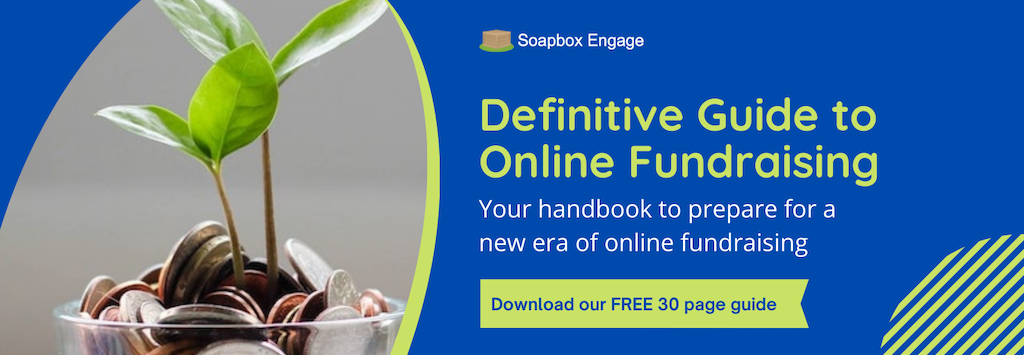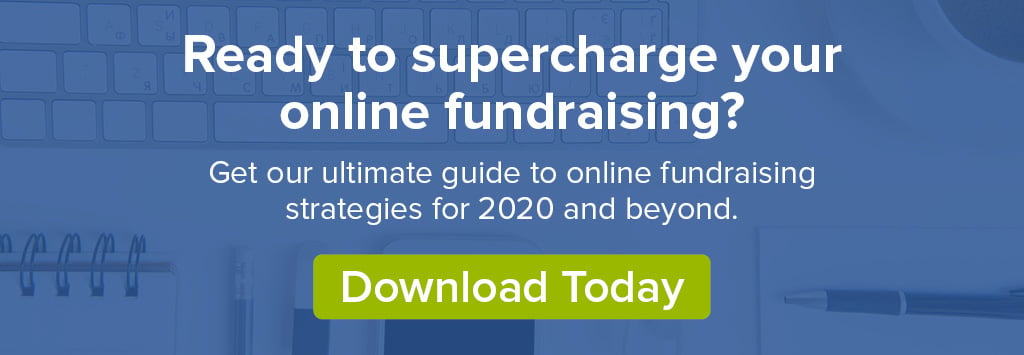
Corporate sponsorship is when a for-profit company provides money, goods, or services to a nonprofit organization's event or program in exchange for promotional benefits, visibility, or other advertisements.
Corporate sponsorships have been around for decades. Many Fortune 500 companies have dedicated corporate social responsibility departments who find charitable organizations to sponsor.
A successful corporate sponsorship is beneficial to both the business and the nonprofit. The organization receives much-needed support, and the sponsoring company gains access to new audiences.
Getting corporate sponsorships can be an overwhelming and daunting task, but the potential benefits are great for everyone involved. Use this guide to learn the basics of corporate sponsorships for nonprofits and how to find the right sponsors for your upcoming events.
Benefits of Corporate Sponsorships
Corporate sponsorships are a marketing strategy that many companies use to promote their product, brand, or service. Sports teams, local entertainment events, and nonprofit organizations are very common recipients of corporate sponsorships.
If done correctly, both the nonprofit and the sponsoring business benefit from corporate sponsorships. When you are preparing to find corporate sponsors, it's helpful to understand what a good sponsor relationship will provide the company.
Sponsorships make a company look good
Local businesses work hard to build a positive identity in the community. How people perceive a company and their overall reputation are critical--especially for small businesses in the social media age!
When a business agrees to sponsor your organization, they want to build their brand image. Partnering with a nonprofit can create a positive image and build trust with current and future customers. This is especially valuable for companies marketing to younger audiences who value social responsibility and want to buy from businesses that are making a positive impact on society.
Cause-related marketing is a fast-growing form of marketing in the business world. Sixty-eight percent of Americans say they are happy to share content "from purpose-driven companies with their social networks." Even more significant, 66% of Americans say they would readily switch from their current product to a new product from a company that has a purpose beyond making money. Corporate sponsorships allow businesses to take advantage of these social trends by investing in causes, organizations, and events that their prospective consumers value.
Sponsorships can increase brand awareness
Businesses are always looking for ways to introduce themselves to new potential customers and increase brand awareness. One positive way to do this is to sponsor events. Sponsorships can be valuable advertisement opportunities.
Big corporations love to sponsor popular local events to maintain their brand awareness (remind people they're still around and investing in the community). Smaller businesses can build community trust and increase brand recognition by providing strategic sponsorships to local organizations and events.
Of course, building brand awareness can increase sales. Many sponsorship deals allow businesses to introduce the audience to their product or service and encourage people to purchase from them.
Some businesses design sponsorships to link purchases to specific events. For example, American Express donated to the "Charge Against Hunger" campaign every time their customers used their AmEx cards.
Sponsorships give the business greater brand awareness and can even drive up sales.
Sponsorships help businesses reach a broader demographic
When a business sponsors an organization or event, they want to reach a new or broader audience. The company would like access to your network of donors, sponsors, volunteers, and supporters in exchange for their sponsorship.
If done correctly, this can be a very symbiotic relationship--the business gains access to your network, and you gain access to their customers. People who are attracted to their company are more likely to be attracted to your nonprofit, and vise versa.
Providing sponsorships is beneficial for most businesses. Sponsorship dollars are marketing dollars well-spent and improve a business's revenue and reputation.
Some sponsorships come with perks
Donating to a nonprofit can result in tangible and intangible perks for the business. Large charitable organizations sometimes offer perks in exchange for high-dollar sponsorships. Businesses may donate money to an event and receive benefits like tickets to the event, gift bags (sometimes containing expensive donated gifts), and other gifts.
Other perks for sponsoring high-dollar events may include the opportunity for the business representatives to interact with VIP attendees or chances to network with other corporate sponsors. Don't underestimate the financial and business value of being able to shake hands and build personal connections.
How to Get Corporate Sponsors
Corporate sponsors are very valuable and sometimes difficult to get. However, businesses want to invest in the local community and engage with nonprofits. Many companies are becoming more willing to invest in causes that align with their brand because corporate social responsibility is a rising value in the business world.
Here are some easy ways to find businesses that align with your organization's mission and offer sponsorship packages that are valuable and worthwhile for everyone involved.
Build a budget and create sponsorship packages
Start by developing an itemized budget for your event or project. Businesses want to know you will use your resources wisely. They also want to know exactly what they're sponsoring.
Include details about how the event will help accomplish your nonprofit's goals. Will the event generate income for your organization (through ticket sales, product sales, or other avenues)?
Create sponsorship packages
Once you determine your budget and how much money you need to raise, create sponsorship levels. Creating different sponsorship levels or "packages" allows businesses with varying budget sizes to get involved. Too many nonprofits unintentionally "box out" smaller corporate sponsors who might not have large budgets but could be valuable supporters.
Avoid overused and unimaginative names for your sponsorship packages. Instead of calling them "Gold, Silver, and Bronze," think of names that stand out from the crowd and reflect your mission.
The Association of College & Research Libraries (ACRL) titled their sponsorship packages "Summa cum laude," Magna cum laude," Honor Roll," and "Dean's List." It's clever, speaks to their audience, and makes their packages stand out. The Cancer Research Conference created three sponsorship packages called "Cure," Progress," and "Promise."
Determine how many sponsors you need at each level to fully fund your project. Ideally, there will be more donor and sponsor opportunities at the middle and lower levels than at the top. Try to bring on more low and mid-range sponsors than you think you need. In the event you cannot find enough major sponsors, it will not derail your project.
Ask for gifts in kind
Many businesses like to give gifts in kind instead of cash. For example, a restaurant might be willing to host an event for free at their location. A local grocery store might be more willing to donate bottled water than to write a check for your next Charity 5K.
Create a list of specific goods and services you will need to make your project or event a success. Allow local businesses to provide what you need.
Be clear about the advertising benefits of each package
Be very clear about how each sponsorship package will benefit the business. Remember, companies sponsor nonprofits because they want something in return. Create a list of how you will promote the business that agrees to "buy" each sponsorship package.
These advertising benefits can include logos on your marketing materials (signs, t-shirts, programs, etc.), press releases, product giveaway and sampling opportunities, and many other free or low-cost benefits. Be creative and think outside the box.
Don't be afraid to leverage your network! Are you on social media platforms? (If not, you should be.) Digital benefits are often more valuable than signage and other advertising. Include details about the size of your network and how you will communicate about sponsoring businesses. (This is where an excellent CRM system and up-to-date directory are very valuable.)
Communicate the vision of the event or program clearly
As you prepare the sponsorship packages, it is essential to write the vision and specific goals for your event or program. Businesses want to invest in local programs that align with their brand and mission. Including details about the desired outcomes will help companies to decide whether or not your organization fits within their ethos. It also communicates that your nonprofit is organized, thoughtful, and uses your resources wisely.
Create a sponsorship information packet
Now that you have all the details about sponsorship packages, your budget, and the event itself, put together an organized packet to give to potential corporate sponsors.
Include information about the project, the inspiration and history behind the program, relevant statistics (attendance at previous events, types of people you anticipate attending, etc.), and other relevant information. Include details about how you plan to advertise your program as well.
Begin looking for sponsors within your network
Before you begin asking businesses to sponsor your upcoming events, consider your audience: who will your event reach, and who is in your current network? Write down as many characteristics of your audiences as possible.
Next, make an exhaustive list of who might attend or be impacted by your upcoming programs. Don't forget to include vendors, spectators, volunteers, employees, and all the other groups of people who might participate in some capacity.
Now that you know your audience make a list of the types of businesses that might be interested in reaching the people in your audience.
What businesses do you already have connections with?
When looking for businesses to sponsor an upcoming event or project, start with your current network.Who do you already know well? Are there small business owners that already volunteer with your organization? Do any of your board members have connections with local or regional brands?
Many organizations overlook smaller local businesses when trying to gain corporate sponsors. However, these companies might be the perfect partner for you! They are usually very invested in the community and often have large local networks.
It's much easier to get businesses who already know, like, and trust your organization to sponsor your events. Start here and work your way out to companies with whom you don't yet have a relationship.
How to solicit sponsors
Now it's time to make the "ask." Compile your list of potential sponsors and begin contacting them. Most of your communication with potential sponsors will consist of phone calls and emails. However, don't be afraid to use social media and other forms of communication to reach out to businesses.
Begin with an introductory email or social media message. Include a very brief description of the program or event and one or two statistics that are relevant to the business (expected attendance, etc.). Ask for a follow-up meeting or phone call.
If you don't receive a response to your initial message, send another message, or try calling the business a few days or a week later. Sometimes it's helpful to add details about other sponsors.This communicates that your event is essential.
It usually requires multiple contacts before you reach the right person at a business and can schedule a phone call or meeting. Don't be afraid to email, message, and phone consistently until you receive an answer.
Landing corporate sponsors takes quite a bit of prep work and a lot of tenacity. However, the rewards for your efforts can be great!
Are you planning to get corporate sponsors for an upcoming event or project? Here are three more resources to help you take the next steps.
- How To Plan A Fundraising Event: The Complete Guide: If you're planning to get corporate sponsors for your next fundraising event, this handy guide will simplify the planning process and help you create an event that will accomplish your fundraising goals.
- 5 Marketing Strategies Every Nonprofit Should Implement: Marketing is just as important for nonprofits as it is for businesses and for-profit corporations. Having effective marketing strategies can also help nonprofits attract better corporate sponsors.
- 4 Skills Every Development Professional Must Have: Asking for corporate sponsorships requires some specific skills and savvy communication. Here are some practical skills that will help you in all types of fundraising, including getting corporate sponsorships.

